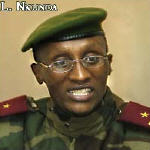
Eastern Democratic Republic of Congo's restive North Kivu province is said to be quiet Friday after the worst outbreak of violence there in months. As VOA Correspondent Alisha Ryu reports from our East Africa Bureau in Nairobi, U.N. officials are working to maintain a fragile cease-fire signed between the government in Congo Kinshasa and Tutsi rebels. The military spokesman for the U.N. Mission in Congo Kinshasa, Lieutenant Colonel Jean-Paul Dietrich, tells VOA that although the fighting between government forces and rebels has ceased, the situation in the north of the provincial capital Goma remains extremely tense. The two sides exchanged heavy machine-gun and mortar fire for eight hours in the Rutshuru Territory in North Kivu on Thursday, causing thousands of civilians to flee and an unknown number of casualties. "Negotiations went on at the highest level in Kinshasa between the U.N. and the Ministry of Defense, between our military force commander and the Chief of Staff of the Armed Forces, and also in Goma with representatives of the CNDP. But, definitely, the situation is tense," said Dietrich. The rebel CNDP group is led by ethnic Tutsi Laurent Nkunda, who is believed to have ties to the government in neighboring Rwanda. After Kinshasa's broader civil war ended in 2002, Nkunda began an armed rebellion in 2006, claiming that he was fighting for minority ethnic Tutsis in eastern Congo and their protection from ethnic Hutus responsible for carrying out genocide against Tutsis in Rwanda in 1994. In January, Nkunda and the government signed a cease-fire that had restored some calm after major clashes devastated North Kivu province late last year. For the past 12 months, the rebels have occupied the southern area of Congo's famed Virunga National Park, home to about 380 rare mountain gorillas. Following Thursday's clashes, Congolese wildlife authorities expressed concern about the status of the gorillas after mortars exploded inside the park. Dietrich says he does not know what specific incident triggered the latest violence. "That is still not clear, and why," said Dietrich. "But there was a lot of tension in the air already for many days and it needed just some small incident, which could blow off the tension and now it has happened. We really regret it, but all of the parties have expressed its willingness to come back to the negotiating table. Even CNDP said this kind of incident is not in their interest at all." North and South Kivu provinces are rich in minerals and other natural resources and the fighting in the north is believed to be tied to rebel attempts to expand the territory under their control and government efforts to stop them. The United Nations estimates about 850,000 residents in North Kivu have been displaced by fighting since December, 2006.
Related articles
- • Bosco Ntaganda Attacked Civilians on Ethnic Grounds, ICC Prosecutor Says (February 10, 2014)
- • Congo Will Not Sign a 'Peace Deal' With Defeated M23 Rebels, Government Says (November 6, 2013)
- • Kabila Congratulates Congo Army for Defeating M23 Rebels (October 30, 2013)
- • Advancing Congo Troops Take Control of Rumangabo From M23 Rebels (October 28, 2013)
- • Congo Army Liberates Rutshuru, Kiwanja and Kibumba From M23 Rebels (October 27, 2013)
- • Congo Army Dislodges M23 Rebels From Strategic Town of Kibumba (October 26, 2013)
- • Congo Army Takes Control of Kibumba After Fighting With M23 Rebels Resumes (October 25, 2013)
- • U.S. Sanctions Rwanda Over Use of Child Soldiers by M23 Rebels (October 4, 2013)
- • Dozens of M23 Rebels Killed by Congo Army in Renewed Fighting (August 22, 2013)
- • M23 Arrests 110 People Accusing Rebels of Looting At Rally (July 27, 2013)
- • DR Congo Asks Rwanda to Turn Over M23 Rebel Leaders (July 26, 2013)
- • M23 Rebels Kill, Rape Civilians in Eastern Congo: Human Rights Watch (July 22, 2013)
- • M23 Rebels in Disarray in Eastern Congo, Says Government Spokesman (July 19, 2013)
- • Bosco Ntaganda in the International Criminal Court's custody (March 22, 2013)
- • Warlord Bosco Ntaganda Turns Himself In at US Embassy in Rwanda (March 18, 2013)
- • U.S. Sanctions M23 Rebel Leaders (December 18, 2012)
- • The M23 Rebels Want to Overthrow Kabila? Nonsense (November 28, 2012)
- • U.S. Treasury Department Sanctions M23 Rebel Leader (November 13, 2012)
- • M23 Rebels Committing War Crimes (September 11, 2012)
- • DR Congo, Rwanda Sign Pact to Fight Rebels in Eastern Congo (July 15, 2012)
- • Kagame Is A Problem for The U.S. and The U.K. (June 23, 2012)
- • US blocking UN report on Ntaganda rebels, Human Rights Watch says (June 21, 2012)
- • Congo Government Says Bosco Ntaganda Rebels Trained in Rwanda (June 10, 2012)
- • Congo Army Advances On Rebels Holdout, Says Official (June 5, 2012)
- • Rwanda Should Stop Aiding War Crimes Suspect Bosco Ntaganda: Human Rights Watch (June 4, 2012)
- • UN Report Accuses Rwanda of Supporting Bosco Ntaganda Rebels (May 28, 2012)
- • ICC Prosecutor Seeks New Charges Against Ntaganda, FDLR Leader (May 14, 2012)
- • Army Suspends Military Operations Against Ntaganda Loyalists (May 6, 2012)
- • Kabila Insists on Military Discipline as Mutiny Fades (April 11, 2012)
- • Kabila, Army Chief of Staff head to eastern Congo to deal with defectors (April 10, 2012)
Tags: |







